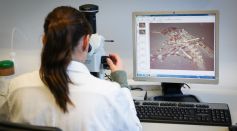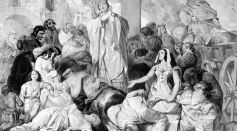MEDICINE & HEALTH

Experts Warn Oleander Plant NOT a COVID-19 Cure
Skin Study Looks at How Wounds Heal and How Drugs Help

Older People More Resilient During the Pandemic, Study Shows
Universal Language: Mayans Used the Same Facial Expressions as Modern People

Israel Reports West Nile Virus-Infected Mosquitos

The Black Death: Bubonic Plague Pandemics Throughout History

6 Steps to Quit Vaping

We Are Nowhere Near COVID-19 Herd Immunity, WHO Warns

Neutralizing Antibodies From Seattle Boat Crew May Hold Key to Protection Against Reinfection

Scientists Discover How to Fight Antibiotic-Resistant Bacteria

New Study Offers Insight on the Elderly's Susceptibility to COVID-19

Purdue Pharma Faces $2.15 Trillion Opioid Epidemic Lawsuit From 49 States

Fecal Transplant Cures Belgian Man With Auto-Brewery Syndrome

New Smartphone App Can Tell If You're Drunk
Most Popular

Trump Administration Declares COVID-19 Likely Originated from Wuhan Lab Leak, Citing Scientific Evidence

Largest Known Volcanic Aquifer Discovered Beneath Oregon's Cascades

New 'Supergiant' Sea Bug Found in South China Sea, Named After Darth Vader

Mediterranean Sea Was Refilled by a Catastrophic Flood Millions of Years Ago





